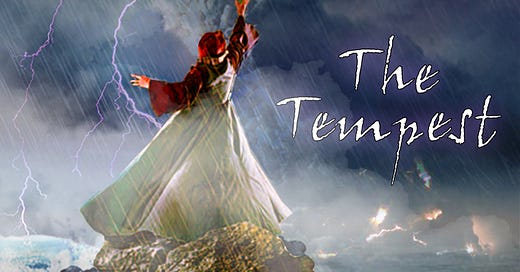Hey!
Just a quick one first off that we’ll be meeting for our next discussion on Saturday 3rd May 9pm BST/4pm EST. Mark it in your diary!
I hope you’re all ready to get stuck into The Tempest.
To help prepare, I’m sharing five themes for you to think about while you’re reading or watching, or to reflect on if you have finished.
I’m going to be sharing another post soon that delves a little bit more into Shakespeare and this specific play. If you have anything specific you’d like me to look at, please let me know!
I will be moving house next week, however, so it might not be until close to our next discussion that I share this one with you!
And if you want to check out where you can find The Tempest, be sure to read the original post which shares everywhere you can read or watch the play.
Five themes to think about: The Tempest
Colonisation
The dynamic between Prospero and Caliban in The Tempest is considered by many to be an allegory for European colonisation. Prospero’s treatment of the original inhabitants of the island, including how they are demonised, is an important aspect of the play.
This allegory invites key questions about the role of cultural domination, exploitation of natural inhabitants and the dehumanisation of others, or those seen as lesser beings. Themes that are still relevant over 400 years on.
Freedom
Almost every character in The Tempest is trapped in some way. From being confined by location to being enslaved, the play questions what it really means to be free—both physically and spiritually.
“As you from crimes would pardoned be,
Let your indulgence set me free.”
Empathy & Forgiveness
At the start of the novel, empathy and forgiveness is lacking—though this changes throughout the novel, as a result of the influence of different characters.
Prospero’s change in mindset between the start and the end of the novel is commentary on empathy, growth and the possibility of a fresh start.
Power & Control
The Tempest covers power and control extensively. Who has it, how they use it, how it changes.
Consider how different characters—Prospero, Caliban and Stephano specifically, deal with gaining and losing power. Does this say anything about leadership? Justice? Or something else?
Nature vs Nurture
Nature vs nurture is the debate over whether people’s personality is something that they are born with (nature) or whether their personality is shaped by how they were raised (nurture).
Prospero believes that Caliban’s (the enslaved native) nature is wicked, and no amount of nurture can change this. Although Prospero first tried to educate and nurture Caliban, he believes his violent nature is too strong to be changed. How does that contrast with his views and relationship with Miranda, his daughter?
“A devil, a born devil, on whose nature
Nurture can never stick.”
Are there any themes I’ve missed? Anything you would like to talk about on May 3rd? Let me know in the comments!
Just try not to give away too many spoilers!
Take care & I’ll see you all again soon!


